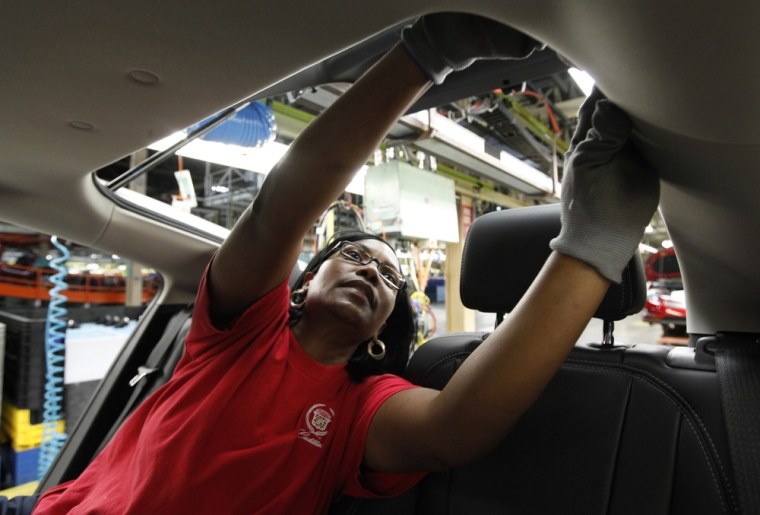A slew of nerve-rattling economic news appears to be raising fears again among some American workers that they’re going to be getting a pink slip instead of a pay check.
A new Gallup poll finds that 30 percent of workers are worried about getting laid off, nearly matching the highs reached in August of 2009 and slightly higher than in 2010. It’s also more than double the percentage of people who had such fears in 2007.
The renewed fears come as many economists expect that August’s unemployment report will show that the economy continued to add jobs last month, albeit at a painfully slow pace. The report will be released Friday.
“We are just not gaining jobs anywhere near the pace that we need to get us out of this situation,” said Sylvia Allegretto, economist with the Institute for Research on Labor and Employment at the University of California, Berkeley.
Given such a slow trickle of new jobs, Allegretto said it’s understandable that even those with jobs would be nervous. After all, most people have seen a friend or family member lose a job and struggle to find an equivalent one.
The unemployment rate stood at 9.1 percent in July, with nearly 14 million people out of a job and actively looking for work.
A broader measure of unemployment, which also includes people who haven’t looked for work recently and people who are working part-time but want a full-time job, currently stands at 16.1 percent.
Americans also have likely been rattled by signs that the nation's economy remains woefully weak, raising fears that the U.S. might once again slip into recession.
The fierce debate in Washington over the debt ceiling, and the subsequent decision by Standard & Poor's to downgrade the nation’s long-term debt, also likely made many people nervous about the future.
In addition, there are headlines such as the ones Californians woke up to Wednesday. Solyndra, a once-promising solar energy startup, announced plans to file for bankruptcy protection and immediately lay off 1,100 workers.
Economist Joel Naroff of Naroff Economic Advisors said if people are starting to get more nervous about losing their jobs, then that could have a ripple effect on the already weak economic recovery.
That’s because if people fear they won’t have a pay check next month, they’ll be more likely to cut back on spending, a major driver of the U.S. economy.
“When you’re worried about losing your job, nothing changes spending habits more than fear,” Naroff said.
Consumer confidence fell in August to its lowest level in two years, according to the Conference Board.
Despite the jitters, Naroff said that, so far, he’s not seeing signs of a massive surge in layoffs.
That may be partly because companies are realizing they have nowhere left to cut, as workers have been stretched to the limit.
“They’re being cautious on their hiring, but they’re not slashing and slicing and dicing their workforce,” he said.
The Labor Department said Thursday that initial claims for state unemployment benefits fell by 12,000 to a seasonally adjusted 409,000.
Still, employers may be contemplating other ways to cut costs on labor The Gallup poll said 44 percent of workers are worried that their benefits will be reduced, and 33 percent are worried that their wages will be cut.
The poll of more than 1,000 workers was conducted in mid-August, right after the debt ceiling deal was cut.
Another polling firm, Rasmusson Reports, also reported this week that its employment index had fallen to its lowest level in a year. The index measures workers’ perceptions of the labor market.
Rasmusson said 17 percent of workers they polled said their firms were hiring, while 24 percent said their firms were laying people off. The poll of more than 8,000 workers was conducted last month.
Job placement firm Challenger, Gray & Christmas said Wednesday that U.S. employers announced plans to cut 51,114 workers in August. That's down sharply from July but up from a year earlier. Challenger said government and nonprofit groups have accounted for the most layoffs this year.
